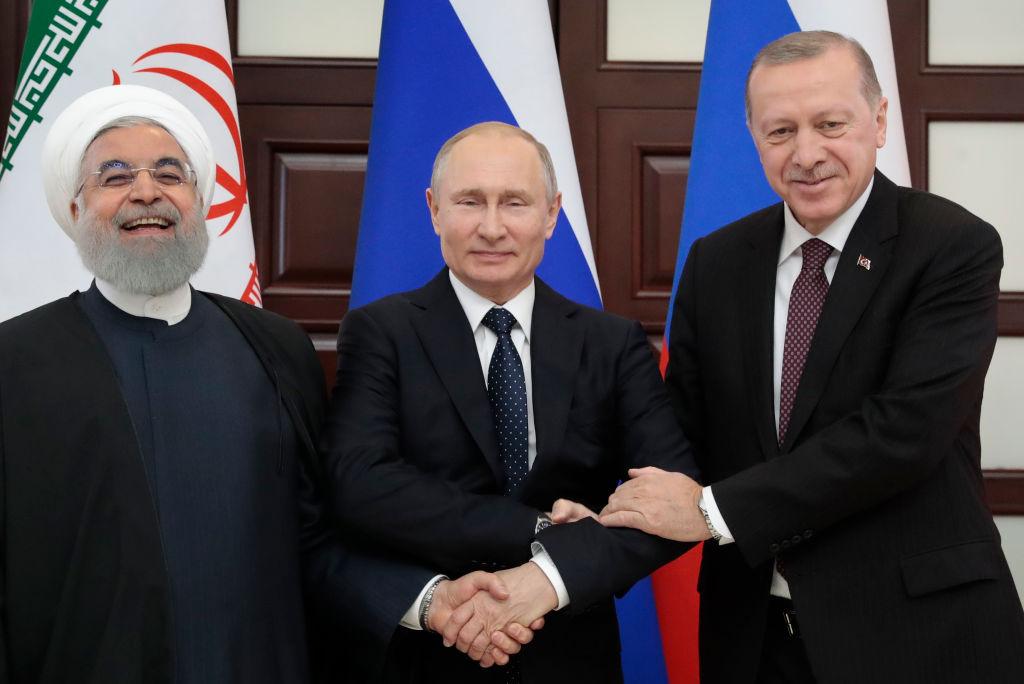Trump’s Syria Withdrawal Is a ‘Positive Step’ and Will Help Assad ‘Re-Establish Control,’ Iran, Russia and Turkey Agree

The leaders of Iran, Russia and Turkey have praised President Donald Trump’s decision to withdraw troops from Syria as a “positive step,” suggesting it will help bring greater stability to the region.
Russian President Vladimir Putin, Turkish President Recep Tayyip Erdogan and Iranian President Hassan Rouhani met in the Black Sea city of Sochi, Russia, to discuss bringing the Syrian conflict to a close. All three agreed that the U.S. withdrawal “would be a positive step that would help stabilize the situation in this region, where ultimately the legitimate government [of Syrian President Bashar al-Assad] should re-establish control,” Putin said during a joint press conference on Thursday, Agence France-Presse reported.
Putin also hailed the meeting as “constructive and business-like,” saying that Russia, Iran and Turkey had agreed to work in “close coordination” and “strengthen cooperation.”
"Let me note that the Iranian and Turkish colleagues are ready to work as a team with an aim of finally defusing tensions and stabilizing [the Syrian city of] Idlib. We have agreed to take additional steps in this respect,” Putin said, according to Russia’s Tass news agency.
Trump’s December announcement that U.S. forces would withdraw from Syria was met with intense criticism from Republican and Democratic lawmakers in Washington. Close U.S. allies also criticized the decision, taking issue with the president’s assessment that the Islamic State militant group (ISIS) had been defeated. Critics in Washington argued that the move would embolden ISIS, while also allowing Iran to maintain a foothold in the country. Assad’s military has been supported by Iran and Iranian-backed militant groups, such as the Lebanese group Hezbollah.
But the Trump administration has remained firm in its decision to withdraw from Syria, while also addressing what it perceives as the growing regional threat from Iran. As Iranian, Turkish and Russian leaders met in Sochi, the U.S. led a conference in Warsaw, Poland, about “peace and security” in the Middle East. The primary topic of concern for the U.S. was Iran.
“Leaders from across the region agreed that the greatest threat to peace and security of the Middle East is the Islamic Republic of Iran,” Vice President Mike Pence said at the conference on Thursday.
The Trump administration also ramped up pressure on the European Union to withdraw from the 2015 Joint Comprehensive Plan of Action, commonly referred to as the Iran nuclear deal. Trump stepped away from the international agreement last May and his government has reimplemented harsh sanctions targeting the Persian Gulf nation. But consistent reports from United Nations nuclear watchdog have assessed that Iran remains in compliance with the international treaty, despite the U.S. decision. European nations have criticized Trump’s move as well, pointing out that the deal has effectively worked to curb Iran’s nuclear capabilities.
Commenting on the dueling conferences in Warsaw and Sochi, Robert Czulda, a professor of Middle Eastern politics at the University of Lodz, in Poland, told The Independent that it demonstrated the growing disconnect between two international factions.
“It’s like before the First World War or Second World War and you had two camps, you had two alliances,” Czulda said. “Here in Warsaw, it’s not a peace conference. This is about building an alliance,” he pointed out. “It’s also very important for Russia to show the world that it’s also the leader of its own camp.”
On Wednesday, Israeli Prime Minister Benjamin Netanyahu suggested that war was a very real possibility. He said he planned to meet with “representatives of leading Arab countries” to “advance the common interest of war with Iran.”